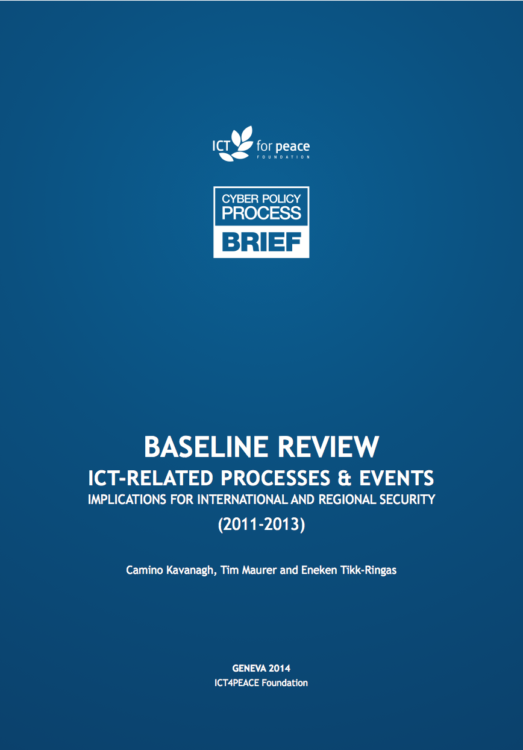
ICT4Peace is pleased to announce its latest publication ‚‘Baseline Review of ICT-Related Processes and Events: Implications for International and Regional Security’ by Camino Kavanagh, Tim Maurer and Eneken Tikk-Ringas.
Download a PDF copy of the report here.
‘Over the past five years, states have become increasingly engaged in a series of regional and international policy discussions and debates over ‘cyber security.’ This engagement stems from a growing sense of insecurity regarding vulnerabilities in computer systems and related technologies, and how they can be exploited for malicious purposes. Vulnerabilities and threats in this environment have been recorded since the 1980s and both state and non-state actors have found innovative ways and means to respond to them.Yet, it was only in the past five to seven years that threats and vulnerabilities were elevated to the seat of high politics and strategy, and placed squarely (oftentimes with exaggerated passion) on national, regional and international security agendas.
The growing interest of states in ‘cyber security’ has taken place against a background of important shifts in the global strategic environment: the rise of China as a global economic and regional military power; the global financial crisis, the effects of which are still resonating; and an increased assertiveness in international and regional politics on the part of many rising middle income states. The uncertainty in the international environment provoked by these shifts has added to the sense of complexity surrounding discussions and debates on ‘cyberspace’ and the use of information and communications technologies (ICTs) for attaining political, military or economic advantage. More recently, this interest in greater state involvement was inadvertently stoked by the role ICTs have, and continue to play in the political upheavals in the Middle East and North Africa; the alleged state use of sophisticated malware to achieve foreign policy goals; and Edward Snowden’s disclosures on the monitoring and surveillance practices primarily of the U.S. National Security Agency (NSA) and the UK Government Communication Headquarters (GCHQ).
Despite a flurry of activity in international and regional fora in response to these concerns, limited progress was made towards reaching consensus on any agenda before 2013. In fact, the outcome of the World Conference on International Telecommunications (WCIT) in Dubai in December of 2012 confirmed deep divisions among states regarding how the Internet should be governed, and a growing overlap between Internet governance and national and international [cyber] security concerns.The outcome of the WCIT conference also confirmed a widening geopolitical divide between states with very different visions of cyberspace – and the Internet in particular: an open, bottom-up ICT environment or ‘cyberspace’ underpinned by democratic values on the one hand, and a closed, top-down, state-dominated ‘information environment’ protected by the principles of state sovereignty and non-interference on the other.
Notwithstanding, 2013 witnessed some positive developments with multi-lateral agreements within the framework of the United Nations (UN) and the Organization for Security and Cooperation in Europe (OSCE) on the applicability of international law and other existing norms and principles to cyberspace, confidence building measures (CBMs) and capacity building measures. Bilateral agreements between Russia and the U.S. on CBMs, and the initiation of other regional and bilateral processes were also promising signs.’
About the Report
At the 2013 Seoul Conference on Cyberspace, the ICT4 Peace Foundation hosted a side-meeting during which strong emphasis was placed on ensuring greater inclusivity with regard to on-going and emerging cyber security-related processes, including with regard to ensuring greater regional participation in related discussions and debate, and greater involvement of civil society, industry and academia (as per the 2013 UN GGE report). ICT4Peace Foundation’s related plenary Statement reiterated these views, committing itself to ensuring that information on the different processes reaches a broader geographical audience and establishing means to report these views to government.This report is a first step in this direction.
The report is structured around the following three areas:
- International and regional security (the predominant focus);
- Transnational crime and terrorism; and
- Governance, human rights and development.
These areas are obviously interdependent, with developments in one area often impacting another, yet they have traditionally been approached separately through distinct communities of practice and fora.
This has been the case over the past fifteen years; yet more recent developments demonstrate that these policy areas are converging, thus constituting an opportunity for wider ranging agreements on the one hand, and greater risk of misunderstanding and tension on the other. The report will serve as a baseline for future annual reports with this specific one covering the period spanning January 2011 to December 2013 (while also providing background on earlier events). It also highlights some of the core policy events and processes to watch out for in 2014.
About ICT4 Peace
The ICT4Peace Programme on Rights and Security in Cyberspace was launched in 2011 with the aim of following, supporting and informing bilateral and multilateral diplomatic, legal and policy efforts to achieve a secure, prosperous and open ICT environment. Sample ICT4Peace publications can be found here and include:
- What Next? Building Confidence Measures for Cyberspace (2013)
- An overview of global and regional processes, agendas and instruments (2013)
- The Reach of Soft Power in Responding to International Cybersecurity Challenges (2013)
- ICT4Peace brief on upcoming Government Expert consultations on Cyber-security (GGE) at the UN in New York (2012)
- Getting down to business: Realistic goals for the promotion of peace in cyber-space (2011)
